What does chair caning cost? How much does it cost to re-rush a chair? How much will I have to pay to get my wicker rocker repaired?
Here’s a general information pricing guideline to answer all your questions about repair costs for your cane, rush, splint, Shaker tape,wicker furniture and other types of chair seat weaving.
The prices below are what you can expect to see from seatweavers and wicker restoration professionals across the country. Use this pricing schedule only as a general guide for the typical charges you might expect in your area.
Keep in mind that not everyone charges the same way, and pricing varies drastically across the country, depending on the cost of living in the area, the weaver’s years of experience, the time and labor involved in completing the project, the material fees, etc., etc., etc.
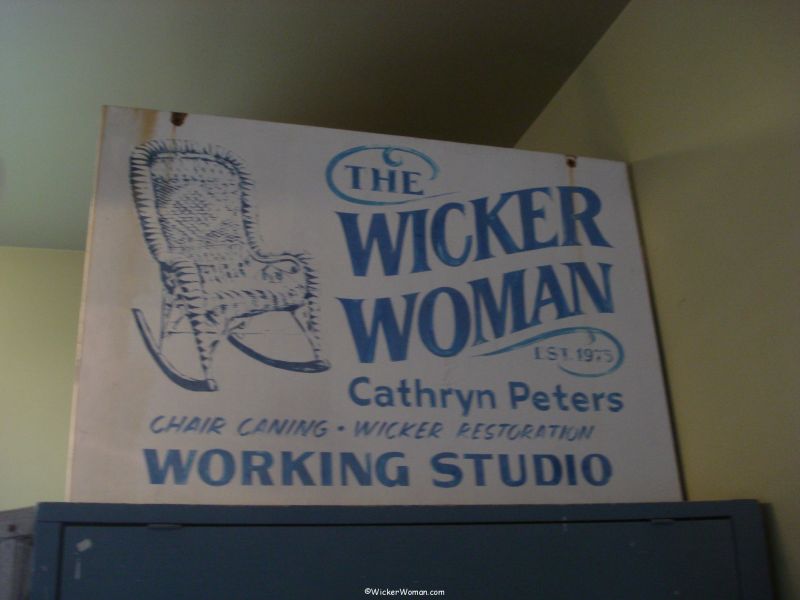
After working in this field for 40+ years, I retired from active day-to-day cane and wicker restoration work in September of 2013 and have limited my restoration work to selective projects only. However, I continue to update and maintain this website, send an email newsletter, teach, demonstrate, lecture, blog, and provide coaching and consultations with clients.
Check the National Furniture Repair Directory™ to find a pro near you to fix your furniture! Thanks to all my loyal clients, subscribers, and followers throughout these 40+ years in business and 20+ years on this website since 1999!
**Note: The 2013 pricing schedule below was updated to reflect current charges as of September 2024.
Chair caning and Wicker Repair pricing:
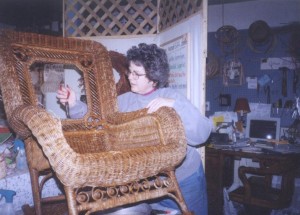
Labor: $100 – $250.00 per hour, plus materials ($50-$150)
Many shops repair and restore both rattan reed and paper fibre wicker repairs but may not work on outdoor or plastic wicker.
Hole-to-Hole or Traditional Hand Caning:
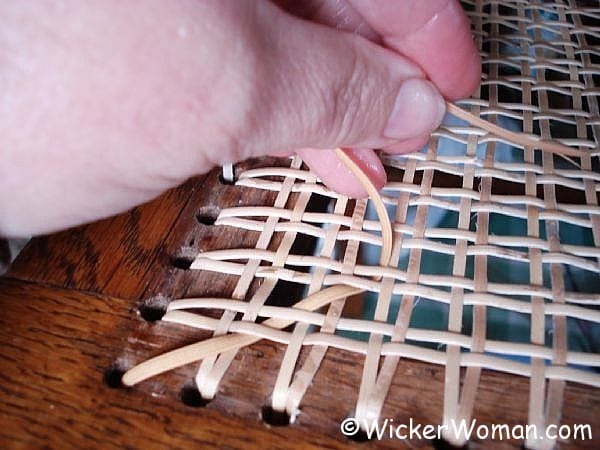
Labor: $3.50 – $6.00/per drilled hole, plus materials ($25-$50)
More than 72 holes: $4.00 – $8.00/per drilled hole, plus materials
Holes are drilled around the perimeter of the chair seat frame and individual strands of cane are hand-woven through the series of drilled holes.
Cane Webbing, Pressed Cane, or Sheet Cane:
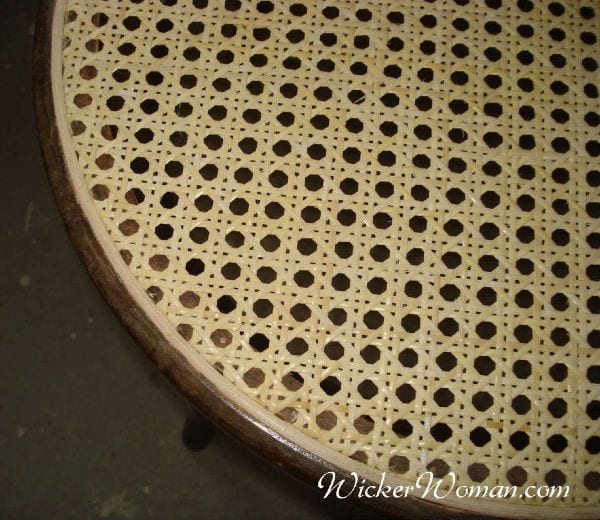
Labor: $5.25 – $10.00 per inch per longest rail, or diagonally, or $1.00 per square inch, plus materials ($20-$75)
Prewoven sheet cane is set into a routed-out groove on the top side of the chair, held in place with a reed spline, and no holes are drilled in the framework.
6MM wide binding cane, porch cane, new england porch weave
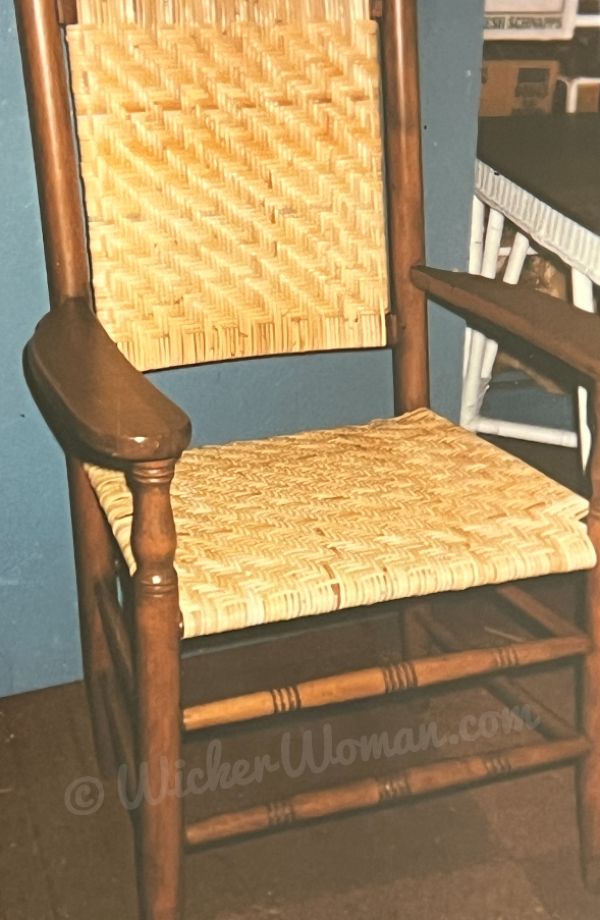
Labor: $7.25 – $10.50 per inch, longest rail or diagonally, plus materials ($40-$105)
A two-layer weave is applied to both the top and bottom around the seat rails, creating a pocket in a 3×3 or 4×4 twill weave.
This porch cane weave is frequently seen in the seats and backs of porch rockers and is weather-resistant, hence the name “Porch Cane.” It can also be woven in a Diamond, Basket Weave, Chevron or New England pattern weave.
Star of David, Spiderweb, or Daisy Caning:
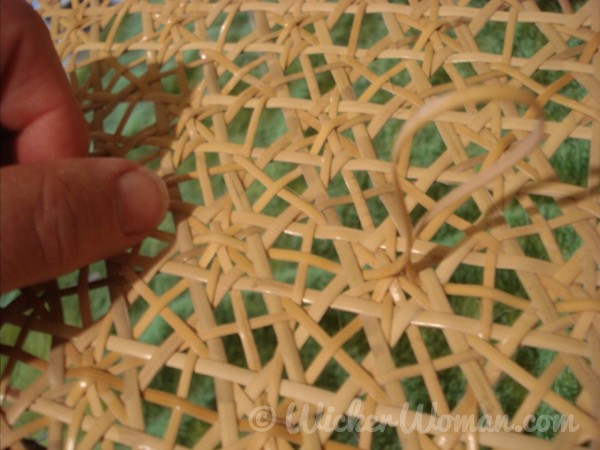
Labor: $6.50 – $10.50 a hole, plus materials ($40-$105)
These fancy, very intricate, and difficult hand cane weaves use two different gauges of cane. They are not as sturdy as the Traditional 7-step Method of Hand Caning.
So these patterns are usually reserved for the backs and underarms of Victorian wicker furniture or the backs of chairs and rockers and are typically not used for seats.
Blind Caning, Single Sided & double-sided:
Labor: $6.50 – $12.00 per drilled hole, plus materials.
Blind cane and similar weaves are extremely difficult and very time-consuming weaving technique. Blind caning and double blind caning require each strand to be measured exactly, cut to the exact length, and glued into holes that are only partly drilled through the framework. Usually reserved for very fine, high-end antique furniture or museum pieces.
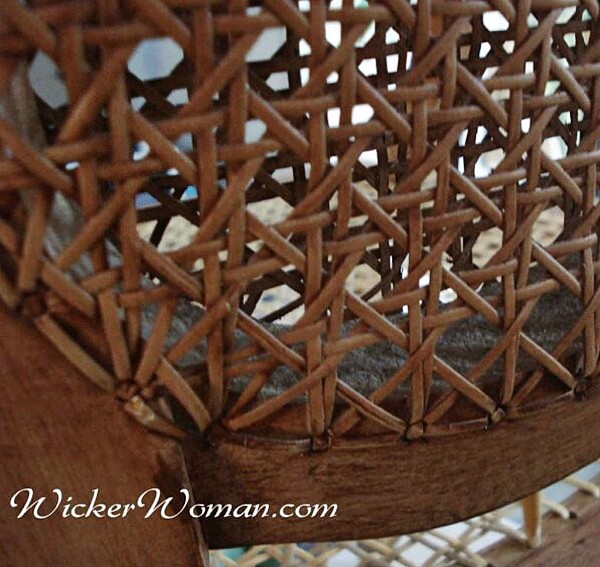
Double Blind Caning–Two Sides
Labor: $7.50 – $13.75 per drilled hole, plus materials (charges for each side)
Exactly like the above Blind Caning with the big exception being that the caning is done on both the front side of each panel in the frame and the back side of each panel of the frame.
Almost always reserved for very fine, high-end antique furniture because of the intensive labor cost.
Hand-Twisted Natural Cattail Rush or Bulrush:
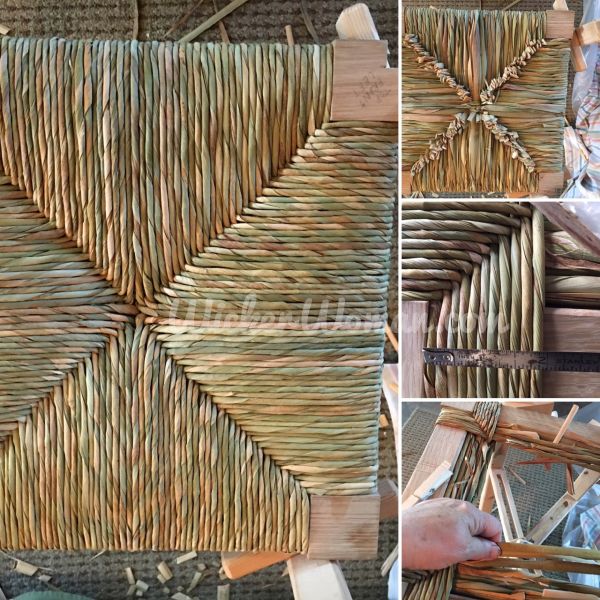
Labor: $20.00 – $30.50 per longest rail inch, including materials
Extremely rare and very laborious type of hand-twisted weaving uses natural materials of either cattail leaves or bulrush.
Usually reserved for museum pieces or high-end quality antiques. Materials are very hard to obtain and not available commercially, so the weaver has to provide their own gathered cattails.
Pre-twisted Natural Rush (PTNR)
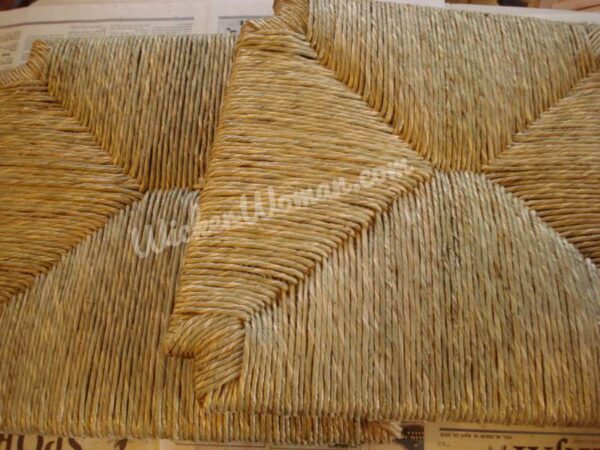
Labor: $8.25 – $12.00 per inch, longest length rail, plus materials ($30-$55)
Sea grass that has been pre-twisted in a continuous length which looks very similar to hand-twisted cattail leaf rush.
Paper Fibre (spelling denotes man-made) Rush:
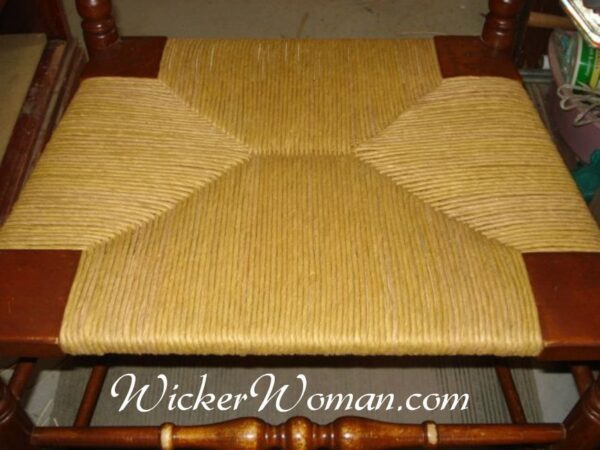
Labor: $5.25 – $12.00 per inch, longest rail, plus materials ($30-$50)
Paper Rush is a continuous strand of man-made paper material wrapped around the seat rungs, forming a distinct pattern of four large triangles meeting in the center. This weave is commonly found on post-1910s Colonial ladderback chairs.
Danish Modern Cord (Scandinavian):
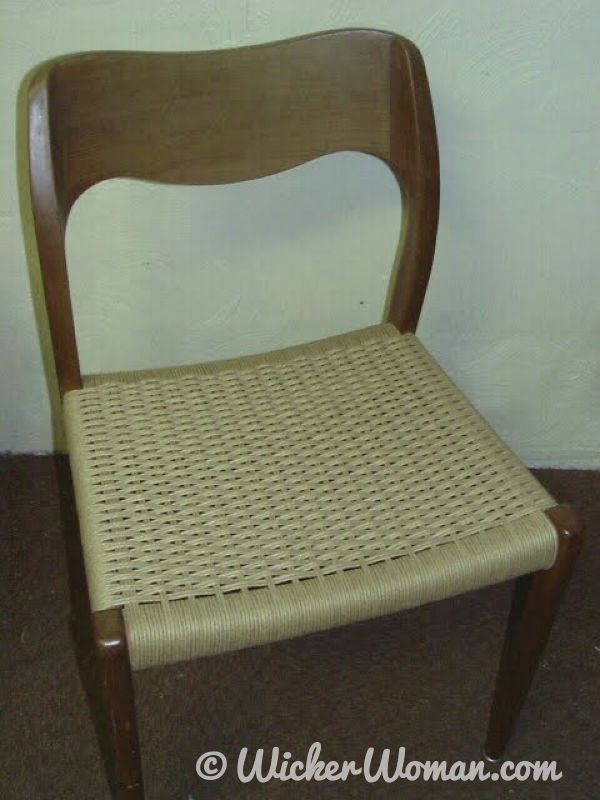
Labor: $8.25 – $15 per inch, longest rail, plus material cost ($50-$100)
The most common pattern uses the 3-ply paper woven around L-nails on the inside rails. Upcharges for double rails or no nails.
Seats and backs are also sometimes woven using wide-binding cane rather than Danish cord, so check with the weaver for additional pricing.
Splint Seats–Woven with Reed, Ash, Oak or Hickory Bark
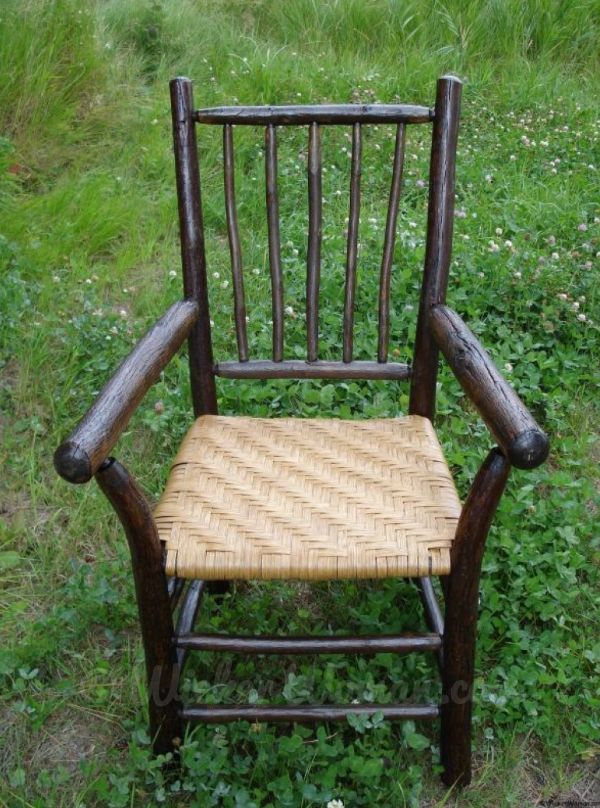
Labor $7.50 – $11.25 per longest rail inch (Reed, Ash, Oak), plus materials ($30-$50)
Labor $8.75 per inch, longest rail, plus hickory bark cost ($65 – $175)
Seat is woven both top and bottom around four seat rungs, creating a pocket. Pattern is usually in a 3×3 or 4×4 twill, but other designs and patterns are available.
Hickory bark is a seasonally available material that is much more costly than the other weaving materials.
Shaker Tape
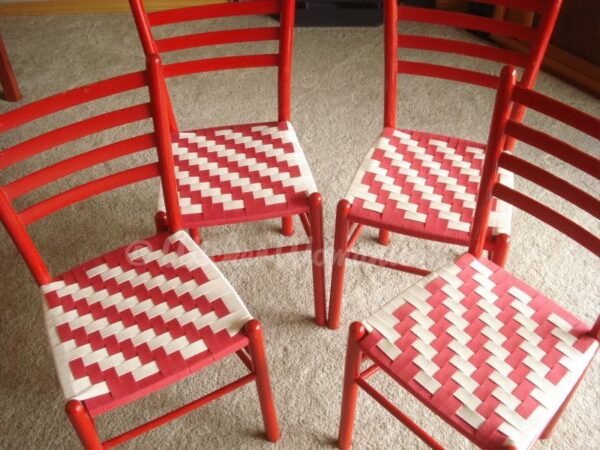
Labor $9.00 – $12.00 per longest rail inch, plus materials ($50-$75)
Cotton tape that comes in a variety of colors and designs with a foam padding in the pocket created by weaving the top and bottom of the seat around the rails.
Now that you are familiar with what general chair caning charges are across the country, you will have an approximation of what your local repair expert might charge.
Then, when you contact your seatweaving professional, you will get an exact charge or close estimate for the repairs needed on your furniture.

Classes, Lectures, Demonstrations

- Private Instruction: $75-$200 per hour, negotiable
- Lectures, demonstrations, and presentations: $200 – $550, plus all expenses paid
- Teaching Class Schedule: For guilds, workshops, and conventions $35-$150 per hour instruction, plus individual student material fee, with most expenses negotiable. Take a look at my teaching schedule for this year.
Weaving Basics <– Back To
Next To –> Seatweaving FAQ
